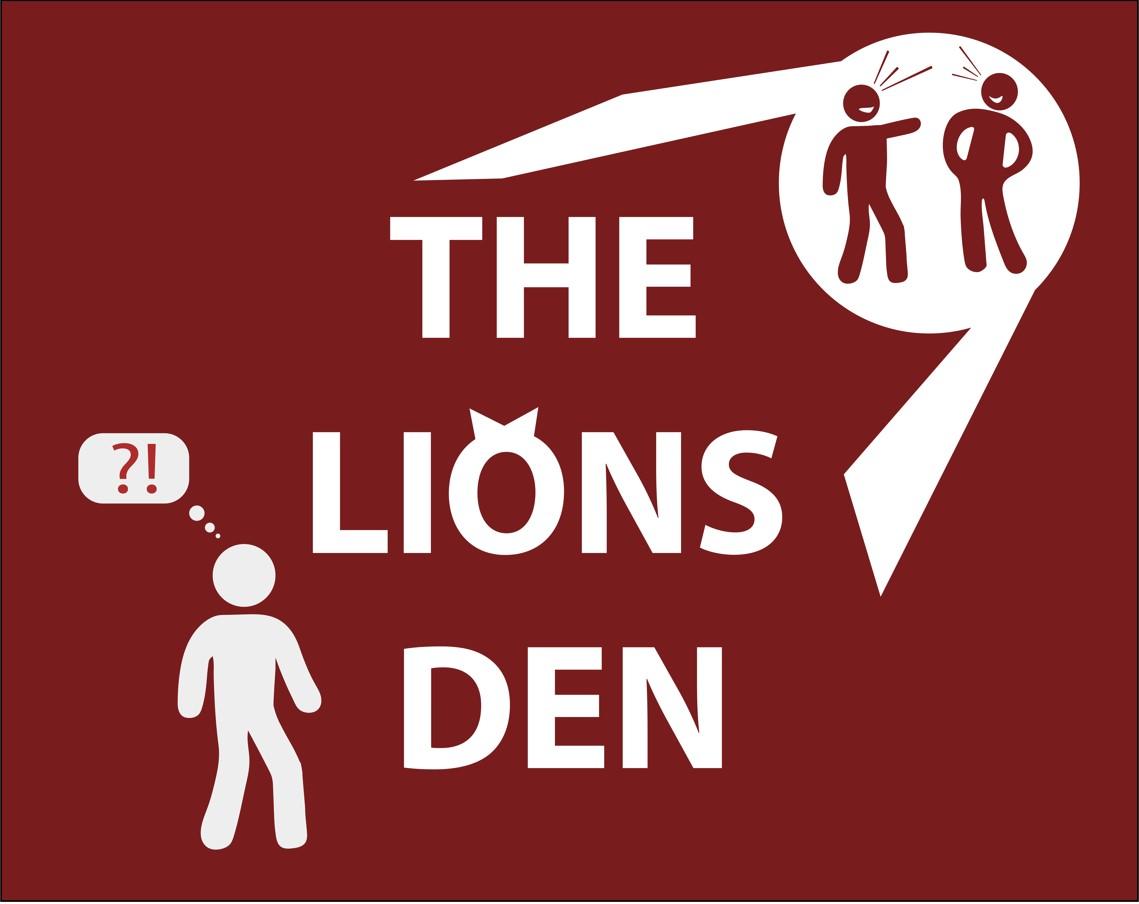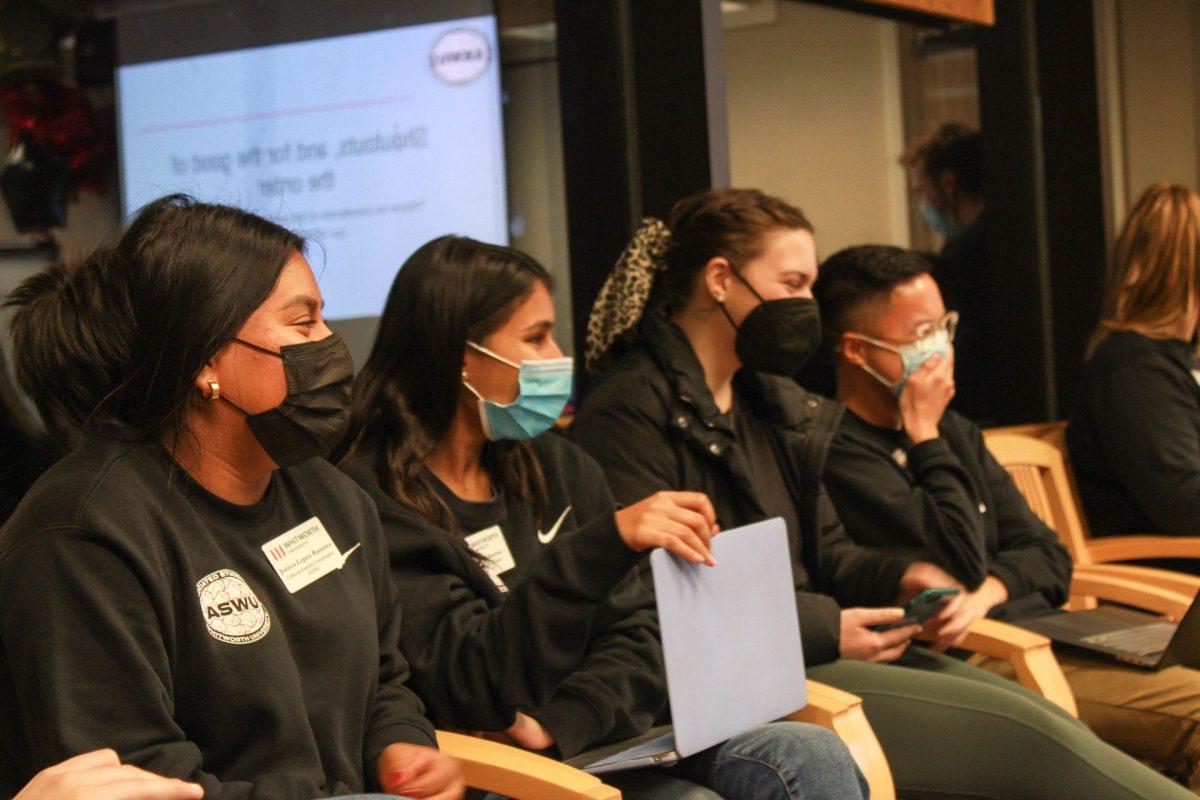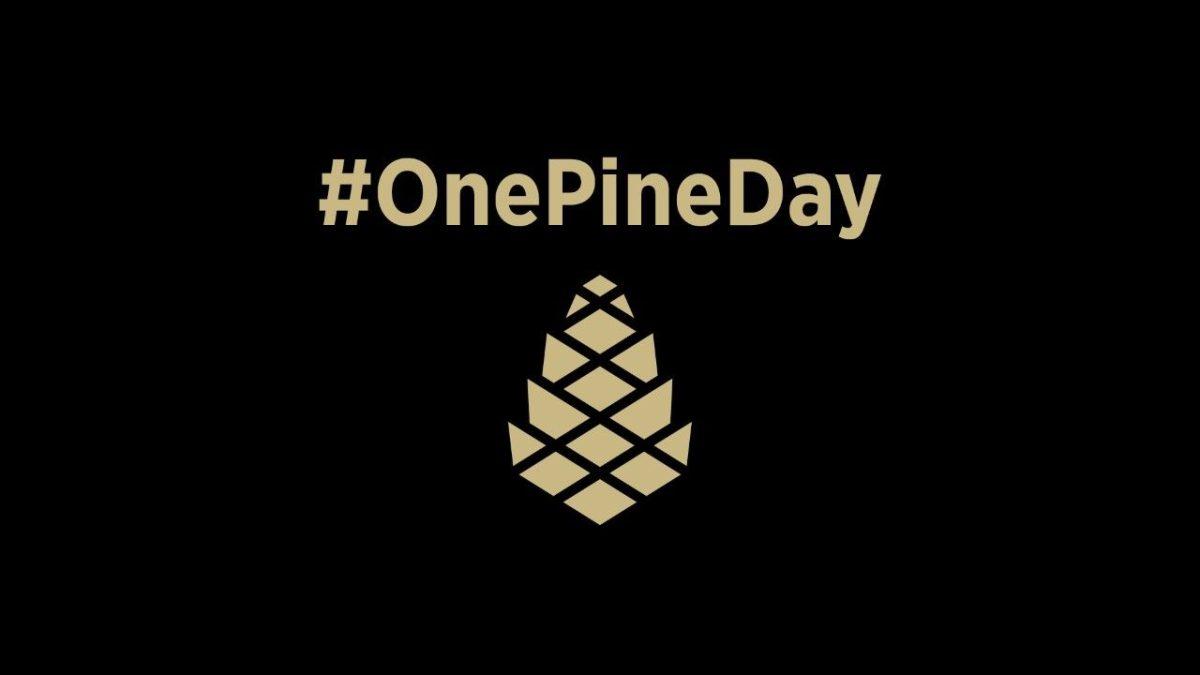By: Nicole Harris, Opinions Editor and Samantha Holm, Arts & Culture Editor

After searching for nine months and sifting through over 60 applicants from across the nation, Scott McQuilkin was announced as the 19th Whitworth President on Jan. 27. During a press conference on the morning of Jan. 28, Brian Kirkpatrick, Whitworth board of trustees chair and member of the presidential search committee, shared that the board “unanimously” voted to appoint McQuilkin as the next president.
At this news, the crowd cheered and gave a standing ovation.
McQuilkin then took the podium and talked about his vision for Whitworth, calling it a place where faculty stand “with and for” students. Nancy Hines, associate vice president of university marketing & communications, asked McQuilkin a range of questions regarding everything from his goals for the five-year strategic plan and his intentions to advance diversity, equity, and inclusion initiatives on-campus, to the winner of the 1972 World Series (McQuilkin aptly responded the Oakland Athletics over the Cincinnati Reds).
On Jan. 28, Whitworthian editorial board members Nicole Harris and Samantha Holm sat down with McQuilkin to get know him and his goals for Whitworth University.
McQuilkin will be inaugurated into the presidential position in the fall.
Nicole Harris: Why did you choose to attend Whitworth for your undergraduate? What made you stay through graduate school and return after your Ph.D.?
Scott McQuilkin: I was an unexpected attendee at Whitworth. I was a senior in high school, and I received a Whitworth catalog – at that time, we had paper catalogs – I received a catalog in the mail. I don’t know how Whitworth got my name. But I was in the liberal arts. The Christian liberal arts mission appealed to me and [I] pretty much came sight unseen…
I didn’t know a soul. Didn’t know any students, didn’t know anybody on the staff…. And then when I was 22, I still had to student teach. I was going to be a high school math teacher. I was going to student teach at Lewis and Clark High School. I was appointed in July, right after my senior year, as the head baseball coach. So, I still had yet to graduate from Whitworth, and I was the head baseball coach and remained in that role for six years.
My second year, I was appointed to the Whitworth faculty as an instructor. [I] went through the promotion process, and then left for three years to go to Penn State, where I earned my doctorate and Ph.D. [I] was an assistant on the baseball program for three years, returned [to Whitworth] in 1993.
“After a lot of conversation and prayer, and conversation with mentors, I moved into that role.”
McQuilkin: [I] was strictly academic for two years. I was chair of the kinesiology department. I was teaching my own academic discipline [and] I was on the Core 150 team. In late summer of 1995, our athletic director left, and Bill Robinson approached me, and invited me to consider becoming the athletic director, which I then did for 14 years.
After that, I continued to teach on the core programs for about 10 years. Core 150 for six years [and] Core 350 for four. [Then] Bill Robinson’s final year, fall of 2009, late that summer, he approached me about moving over to become the vice president for institutional advancement. And after a lot of conversation and prayer, and conversation with mentors, I moved into that role.
And then of course, as you know, in mid-March was appointed the interim president.
So that’s a little bit about my history and where I’ve gone from one step to the next and what does that make this? My fifth career? At Whitworth?
Samantha Holm: Thank you for laying that out for us. That’s helpful.
Harris: What do you see in your future? Your professional future.
McQuilkin: This is it.
Yeah, I’ve never, at no time, ever thought in my work career that there’s a different place I’d like to be. So, I’ve never chosen to pursue administrative or teaching positions elsewhere.
“This is a place that shaped me… Shaped by, shaped by people.”
McQuilkin: This is a place that shaped me. It’s an important part of my life, of my wife, [and] our three kids. And long ago, I determined that this is the kind of place that… for me, I could work here my entire career and look back someday upon retirement, whenever that is, look back and say, “what a rewarding way to spend your adult life”: serving this mission, with these people, for these students.
Harris: And in what ways did Whitworth shape you?
McQuilkin: Long answer to that.
Shaped by, shaped by people. In the press conference today, I shared a little bit about Howard Gage (a math professor of mine), Laura Bloxham (who’s an English literature professor, but she was my Core 150 advisor), Dave Vaughn (my first baseball coach), professional mentors like Bill Robinson (who was the president here from 1993-2000), Beck Taylor for the last 11 years.
It’s people who have modeled, people from whom I have learned, people who have shaped me intellectually, spiritually [and] relationally. The list goes on and on.
If I began to name names, I would leave too many people out, but [as] someone [whose] been here for 40 years, there’s just too many names to name.
But I would also add this though. Our children are now all grown. One is an elementary school teacher, one is in medical, and one is in seminary. And they all have professors and staff – people from Whitworth whose fingerprints are on their lives, on their minds, on their hearts.
And I’m just incredibly grateful for that.
Harris: Doing during your time as president, what are your goals for the university? How do you plan to achieve this vision?
McQuilkin: We’re now launching a process by which we will write, craft our five-year strategic plan and that will entail all the different ways that we need to sustain and preserve this institution. There are ways that we need to make sure to do that missionally, relationally.
So, we’re beginning to cast that vision and see exactly what that might look like, but it is an endeavor to look out five years from now and to say, “what does that very best picture of Whitworth look like five years from now? And how do we achieve that best picture?”
Harris: Do you have an idea of what that picture is for you coming into this role?
McQuilkin: I just want Whitworth to be the very, very best. I don’t know if there’s anything scriptural or biblical about that. But as someone who’s always grown up with a scoreboard in their life, I just want Whitworth to be the very, very best.
“But as someone who’s always grown up with a scoreboard in their life, I just want Whitworth to be the very, very best.”
McQuilkin: [I want] this [to be] a place where other institutions, people from other institutions, say, “you want to know how to do faith learning integration, you go ask those people at Whitworth because they are doing it as well as anyone. Wanna know how to run a residence life program? Go to those people at Whitworth because they are doing it as well as anyone.”
Harris: What is unique about Whitworth culture when compared to other universities? How do you plan to enhance this culture?
McQuilkin: If you’ve been around here long enough, oftentimes we use this “narrow ridge” language – Martin Buber – that says this is a place [in] which we have a mind and heart education. But we believe that both faith and reason, curiosity and conviction… are complementary and not in conflict.
So, refer to that as this grand paradox, that this is a place where we can pursue the truth wherever it may lead us while holding tightly to our Christian convictions.
One of my former mentors, Bill Robinson, said, in, it must have been an interview in 1995, that Whitworth, for him, was maybe one of the most free universities in the country. Because there are institutions that say questions and conversations about faith are just not welcome. And there are institutions that would say, “we’re just going to stay away from certain difficult conversations, or if we do have them, we might choose to provide you the answers,” and at Whitworth, we have chosen to be a place that says, “let’s have those conversations. Let’s be a convening place for those conversations, difficult as they may be. ”
“At Whitworth, we have chosen to be a place that says, ‘let’s have those conversations. Let’s be a convening place for those conversations, difficult as they may be.’”
McQuilkin: There’s going to be tension, we’re going to have people being angry with us for even hosting those conversations, but that’s the place we’ve chosen to be, and that needs to be preserved. It’s a unique place in the higher-ed landscape. It’s unique to Whitworth.
Harris: Was it the same as it was when you first attended?
McQuilkin: I think, people from my era, when they come back and they visit Whitworth, the physical appearance of the campus they would say, “this place looks so different,” and it does physically, the grass is greener, the buildings are newer. It’s just shinier, nicer.
But, if those from my era, my graduating class, stepped inside a Whitworth classroom, and saw the experience that you were getting, the quality of teaching, quality of the education, they walked into a residence hall and saw the community. People from my era would walk into those places, if you wouldn’t [have] been looking outside, you would say, “it’s a place I know. This is the place that I love.”
That hasn’t changed. Not at all. Not to my experience.
“What’s helpful at this particular point in time, is that when a new president comes from the outside, they have so much to learn about the institution, the people, the mission, how things run. In my case, there isn’t some on-ramp of acclamation, of climatization… that’s not there.”
Harris: How are you uniquely suited for this position?
McQuilkin: Can I rephrase the question?
Harris: Yeah.
McQuilkin: Cause, uniquely makes, I don’t know that I’m unique in any way. To answer it that way, that way makes me sound like I think I’m special.
What’s helpful at this particular point in time, is that when a new president comes from the outside, they have so much to learn about the institution, the people, the mission, how things run. In my case, there isn’t some on-ramp of acclamation, of climatization… that’s not there.
So, rather than waiting one year from now to learn the place, and then begin a strategic planning process, we’re actually already underway. So that doesn’t make me a unique individual. It makes the circumstances of hiring somebody from within at this moment in time, something that is helpful. I think. So that’s how I would phrase it.
“[We need to be] listening well to their stories and experiences, to be partners on the path to justice, to be accountable for whatever failures that we have… to make this a place where students feel like they belong.”
Harris: You described Whitworth as being a place where faculty stand “with and for students.” How do you intend to stand with and for minoritized student groups at Whitworth, such as members of the LGBTQ+ community, those with disabilities and non-Christians?
McQuilkin: Whitworth is, at our very, very best [a place], not only [where] we aspire, but [where] all of our students feel like this is a place where they belong. And for us to do that well, that means that we need to hear [and] listen well to their stories and their experiences.
As I said earlier today, in that Q&A session, [we need to be] listening well to their stories and experiences, to be partners on the path to justice, to be accountable for whatever failures that we have, and I know I will have them daily, to make this a place where students feel like they belong, and that’s true of faculty, staff and students…
I’m working right now with Roberta Wilburn, who is the interim chief diversity officer. We’re in conversations about different groups of students that we need to bring together and we’ll be doing that over the next couple of months in the Hawthorne house living room with a small group of the administrators and some of those different groups, students from different groups that you’ve just identified, to talk about their experiences and hear how we can make Whitworth a better place for them.
Holm: So, you mentioned some of your professional mentors, Bill Robinson and Beck Taylor, what did you appreciate about their approaches? What elements of their approaches would you want to carry with you and what are some things you might want to do differently?
McQuilkin: So, let me [say that just] because I comment on one person, say one attribute of Bill, that doesn’t mean that Beck doesn’t possess it and vice versa… So, Bill, Bill was so uncommon in his ability to make you feel known. His ability for knowing students, knowing faculty and staff. He was just a rare person that way. And so, in this role, I think we all, this is true [for] me, want to be known and valued…
Beck is an uncommon executive, always thinking ahead, the strategic planning process. [He] understood the spectrum of higher education, so he was uncommon in those ways.
And of course, both were exceptional, exceptional leaders.
Harris: What do you want your legacy to be?
McQuilkin: I don’t start till Monday… At this moment in time, on Jan. 28, I don’t have any answer for you. I’ll let other people, if there ever is a legacy, I’ll let other people define it and describe it.
“The question asked to me [by the board offices] was, would I be a candidate? And I said, ‘No, I will not be.’”
Holm: I want to ask about this because Brian Kirkpatrick was saying that they didn’t officially consider you for the position.
McQuilkin: Correct.
Holm: But they had mentioned, “Oh, would you consider being in this position permanently?”
McQuilkin: Yeah.
Holm: And so, you said, “No, I shouldn’t be considered an official candidate because that would potentially undermine the integrity of the search.” So how were you able keep that a secret—that you had basically already been considered for the position?
McQuilkin: Yeah, let me correct that. So, so those are nine months apart. So, when I was appointed interim… that [was] in mid-March, when I was appointed interim… The question asked to me [by the board offices] was, would I be a candidate? And I said, “No, I will not be.”
And there are two lines of questions one would ask themselves: could you, do you want to, could you get appointed?
“We needed to do a national search. We needed to do the very best we could for the university.”
McQuilkin: For me, those questions were not even entertained because we needed to do a national search. We needed to do the very best we could for the university. And I am convinced – was convinced – that the presence of an interim in the candidate pool would suppress the applicant pool, and Whitworth, therefore may not necessarily get the very, very best person.
Oh, by the way, when Bill Robinson applied in 1992-93, if the interim were a candidate, he would not have applied. We wouldn’t have had Bill Robinson. The university needed to do the very best it could, and so that was a decision that I made, made very early, and that was the end of that.
Holm: Okay, thank you for clarifying that.
McQuilkin: What happened then, as Brian [Kirkpatrick] shared in the press release, is that after the search process, that eight-month process, concluded without an appointment, the board then contacted me, and asked me, “would you be open to a conversation about the permanent position?” And at that point, we had a conversation.
Harris: Were there any questions that you wish we would have asked you?
McQuilkin: I don’t think so.
Holm: Or any questions you wish we didn’t ask you?
McQuilkin: No, all very good. No, I think I’m all good.















 Spokane?
Spokane?